Introduction
The Department of Electrical Engineering of REC, Rewa is one of the finest and well equipped in the Vindhya region. Department of Electrical Engineering GEC Rewa was established in 1964. In the present Model science Collage building with professor M. B. Jain as founder Head of department in Electrical Engineering. Subsequently it was shifted to PGBT building. Thereafter finally in 1972 it was shifted to present campus as spreading above 250 acres (total collage area).The department of Electrical Engineering is one of the largest departments in REC Rewa, and has a distinguished faculty, holding degrees from renowned institutes in India. Under the able Headship of Prof. A. B. Sarkar and a strong faculty team, the Department offers an 8 Semester B.Tech. Programme in Electrical Engineering. The Primary objective of the department is to provide quality education and training at the undergraduate level in the areas of Electrical Engineering. The Department has very good laboratories with some stat-of-the-art equipment for better practical understanding of the students. Various activities carried out by the department put the students on busy schedules so that they can adapt to the modern industrial requirements. The Faculties are continuously working tirelessly for the overall benefit of the Department and the society.
Quick Facts
Year of Start
: 1964
Head of Deapartment
: Prof. A. B. Sarkar
Courses
: BE In Electrical Engineering
No. of Seats
: 60
Down the Memory Lane
Department of Electrical Engineering GEC, Rewa was established in 1964. Initially classes were held in Science College building with professor M.B.Jain as founder Head of department in Electrical Engineering. Subsequently it was shifted to PGBT building. Thereafter finally in 1972 it was shifted to present campus as spreading above 250 acres (total college area).
On academic front, this Institute was affiliated to APS University, Rewa till 2000. Thereafter, this Institute has been affiliated to RGPV (Rajiv Gandhi Prodyogiki Vishvwidalaya), Bhopal. Chronological order of HODs from beginning are as follows:-
- Prof. M. B. Jain
- Prof. V.R. Ekbote
- Prof. U. S. Bhatnagar
- Prof. N. M. Khan
- Prof. D. S.Saxena
- Prof. V. L. Shrikhande
- Prof. G. P. Gupta
- Prof. A. K. Trivedi
- Dr. S.C. Kapoor
- Prof. A. B. Sarkar
An amazing turn took place in 1998 when Govt. of M.P. declared this institute as autonomous society with a board of governors to look after with Minister (Department of technical education) as its chairman. Thereafter this Institute was renamed as REC (Rewa Engineering Collage), Rewa.
Up to year 1981 this institute was following the annual Academic calendar and thereafter semester system was introduce. In new scheme mid semester test has been introduced as a continuous evolution process. Weighted to sectional marks reduced and Seminar, quiz, assignment assessment and industrial training have been introduced in each of the semester to make the student more trained in communication skill and latest technology. Online classes, tests & assessments on platforms like Great Learning started for session 2020-21 onwards due to Pandemic situation. Also Webinar & hands-on training are being continued through online mode.
About the Department
The Electrical Engineering department has 11 highly qualified and dedicated faculty members who possess the Ph. D/ M.Tech degree from premier institute like IIT and NIT. The Electrical Engineering department plans to create an excellent national workforce by imparting students a high-quality education, cutting-edge research exposure, and a world-class innovation ecosystem. Additionally, it plans to formulate and implement novel teaching mechanisms to provide its students a holistic exposure to a world-class education. The department also envisions itself as a center of excellence in teaching to create a well-educated, technically competent, and socially responsible workforce for meaningful, inclusive, and overall societal development of India and the world.
Program Outcomes
TThe Following outcomes or scopes are covered into the design of syllabus: Engineering Graduates will be able to:
Engineering knowledge: Apply the knowledge of mathematics, science, engineering fundamentals, and an engineering specialization to the solution of complex engineering problems.
Problem analysis: Identify, formulate, review research literature, and analyze complex engineering problems reaching substantiated conclusions using first principles of mathematics, natural sciences, and engineering sciences.
Design/development of solutions: Design solutions for complex engineering problems and design system components or processes that meet the specified needs with appropriate consideration for the public health and safety, and the cultural, societal, and environmental considerations.
Conduct investigations of complex problems: Use research-based knowledge and research methods including design of experiments, analysis and interpretation of data, and synthesis of the information to provide valid conclusions.
Modern tool usage: Create, select, and apply appropriate techniques, resources, and modern engineering and IT tools including prediction and modeling to complex engineering activities with an understanding of the limitations.
The engineer and society: Apply reasoning informed by the contextual knowledge to assess societal, health, safety, legal and cultural issues and the consequent responsibilities relevant to the professional engineering practice.
Environment and sustainability: Understand the impact of the professional engineering solutions in societal and environmental contexts, and demonstrate the knowledge of, and need for sustainable development.
Ethics: Apply ethical principles and commit to professional ethics and responsibilities and norms of the engineering practice.
Individual and team work: Function effectively as an individual, and as a member or leader in diverse teams, and in multidisciplinary settings.
Communication: Communicate effectively on complex engineering activities with the engineering community and with society at large, such as, being able to comprehend and write effective reports and design documentation, make effective presentations, and give and receive clear instructions.
Project management and finance: Demonstrate knowledge and understanding of the engineering and management principles and apply these to one’s own work, as a member and leader in a team, to manage projects and in multidisciplinary environments.
Life-long learning: Recognize the need for, and have the preparation and ability to engage in independent and life-long learning in the broadest context of technological change.
Message from HOD
We are in the age of electricity. So, we train our students in frontier areas of electrical engineering such as power system, power electronics, control strategies for complex systems, electrical machines, machine design, network analysis, high voltage engineering and instrumentation &measurements technology. We have specialized faculties in all of these important areas of electrical engineering.
The department of Electrical Engineering (EE) has consistently maintained an exemplary academic record. The greatest asset of the department is its highly motivated and learned faculties. The available diversity of expertise of the faculties with the support of other staffs prepare the students to work in the global multicultural environment. The graduates of the Electrical Engineering stream have been selected by some of the leading industries. The department not only aims to make our students technically sound and knowledgeable but also to nurture their wisdom and make them a better and responsible human being. We hope that we will continue to deliver our best to serve the society and mankind. It is also expected that our students will continue to pass on the skills which they have developed during their stay at this department to the whole of the world for a better society.
“Engineers are the creators of the new world”. We welcome you to be a part to this creative process.
With warm regards
Prof. A.B. Sarkar
HOD EE Department
Vision of the Department
To prepare Electrical Engineering professionals, innovators and entrepreneurs with the effective technical and interactive skills to meet the dynamic industrial needs and contribute to green energy and societal empowerment having professional ethics.
Mission of the Department
To evolve as a center of excellence in Electrical Engineering by incorporating creative teaching learning process to impart quality in technical education along with the problem solving skill.
The department will make the best effort to promote the intellectual, ethical and technological environment to the student.
The department invokes the desire and ability of life-long learning in the students for pursuing better career in their chosen fields.
Program Educational Objectives (PEOs)
PEO1: Develop their competency in technical knowledge and analytical ability with innovations to solve emerging real world problem related to Electrical Engineering, ethically and provide economical, feasible and socially acceptable solutions.
PEO2: Improve their technical and analytical competence to analyze, design, and innovate for problems of real life in industry, research and academics related to Electrical Engineering.
PEO3: To develop the qualities of leadership, teamwork, self & lifelong learning and their inter-personal skills to serve the nation and society ethically and responsibly.
PEO4: Prepare and encourage students to Innovate themselves in ever-changing socioeconomic and technological environment of the 21th century by working efficiently with high standards of ethics for sustainable development.
Laboratory Details
To strengthen the theoretical knowledge and provide aid in research and consultancy projects, the department maintains well-equipped laboratories .The laboratories are:
Basics Electrical engineering Lab
Basics Electrical engineering Lab
The BEE Lab. at REC, Rewa is used with the institute core course “Introduction to Electrical Engineering”. This lab can accommodate about 210 students in a semester for all the experiments as per the curriculum of RGPV, Bhopal.
The experiments are designed to expose students to the practical executions of the fundamental theories of Electrical Engineering.
The various experiments which can be performed at BEE Labs are as follows:
- 1. Basic safety precautions. Introduction and use of measuring instruments – voltmeters, ammeters, multi-meters, oscilloscope. Real-life resistors, capacitors and inductors.
- 2. Verification of Kirchhoff’s laws.
- 3. Verification of Superposition Theorem.
- 4. Verification of Thevenin’s Theorem.
- 5. Analysis of RL, RC, RLC series and parallel circuits. Sinusoidal steady state response of R-L, and R-C circuits – impedance calculation and verification Observation of phase differences between current and voltage. Resonance in R-L-C circuits.
- 6. Demonstration of cut-out sections of machines: dc machine (commutate or-brush arrangement), induction machine (squirrel cage rotor), synchronous machine (field winging - slip ring arrangement) and single-phase induction machine.
- 7. Study of V-I Characteristics of Diodes. Applications of Diodes and their verification.
- 8. Study and verification of digital logic gates.
- 9. Load test on single phase transformer and measure their primary and secondary Voltage, Current and Power.
- 10. Determination of equivalent circuit parameters of a single phase transformer by O.C. and S.C. tests and estimation of voltage regulation and efficiency at various loading conditions and verification by load test.
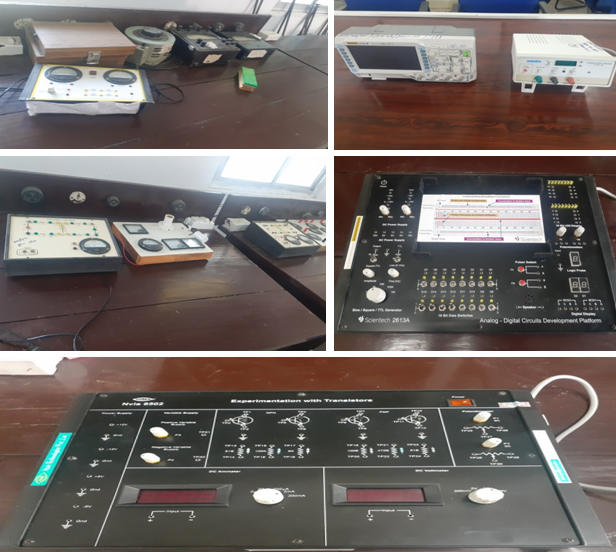
Power system Lab
Power system Lab
The laboratory of power systems lab in the electrical engineering department contains the same hardware and software used by industry professionals in the creation and maintenance of power systems giving students the opportunity to develop the skills and experience that will aid them in the work field.
The various experiments which can be performed at Power systems Labs are as follows:
- 1. Study of different type of Conductors.
- 2. Finding of ABCD parameters of a short transmission line.
- 3. Finding of ABCD parameters of a medium transmission line for nominal T model.
- 4. Finding of ABCD parameters of a medium transmission line for nominal π model.
- 5. Finding of ABCD parameters of a long transmission line.
- 6. Finding of voltage regulation for short, medium and long transmission line.
- 7. Study of construction of cable.
- 8. Finding of Ferranti effect for medium and long transmission line.
- 9. Study of different types of overhead line insulators.
- 10. Study of different types bus bar arrangements of a switchyard.
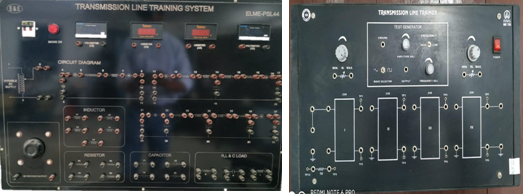
Power system protection Lab
Power system protection Lab
In this laboratory of electrical engineering department students can experiments and design projects to demonstrate the principles and techniques of industrial power system design. Fuses, time over current and instantaneous relays. Differential relaying for transformers and distance relaying for CT & PT.
All conducting experiments as per the curriculum of RGPV, Bhopal. The various experiments which can be performed at Power systems protections Labs are as follows:-
- 1. Determination of operating characteristic of IDMT relay.
- 2. Determination of operating characteristic of percentage biased differential relay.
- 3. Determination of operating characteristic Earth fault relay.
- 4. Determination of operating characteristic of under voltage relay.
- 5. Determination of operating characteristic of over voltage relay.
- 6. Determination of operating characteristic of over current relay.
- 7. To Study of SF6 circuit breaker.
- 8. To study the construction and operation of Buchholz Relay.
- 9. To study the characteristics of Instantaneous relays.
- 10. To study the time-grading protection of feeder [simulation Model].
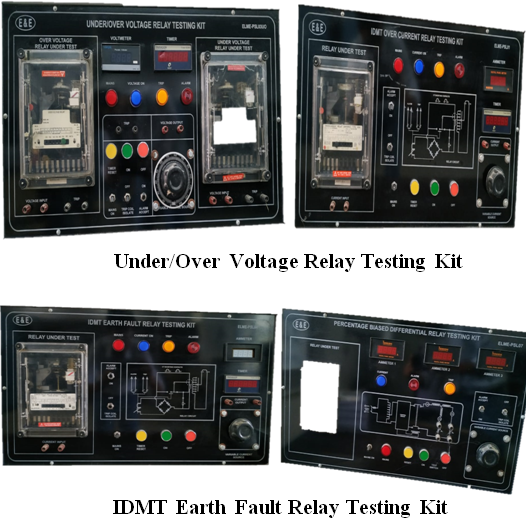
Analog Electronics Lab
Analog Electronics Lab
The objective of this laboratory is to link the theoretical concepts of different analog electronics circuits with practical feasibility there by giving them a scope to learn basic electronics circuits and their different electrical characteristics in a better way.
The various experiments which can be performed at Analog Electronics Labs are as follows:
- 1. Verification of V-I characteristics of a P-N junction Diode.
- 2. Verification of V-I characteristics of a Zener diode.
- 3. Experiments on operation of a half wave and full wave rectifier.
- 4. Study of a Transistor series voltage regulator.
- 5. Verification of V-I characteristics in CE configuration of a PNP Transistor.
- 6. Verification of V-I characteristics in CC configuration of a PNP Transistor.
- 7. Observation of inverting and non-inverting characteristics of a 741 Op-Amp.
- 8. Demonstration on working of 741 Op-Amp as a summing amplifier.
- 9. Observation of functioning of 741 Op-Amp as a voltage follower (buffer).
- 10. Observation of integrating characteristic of a 741 Op-Amp.
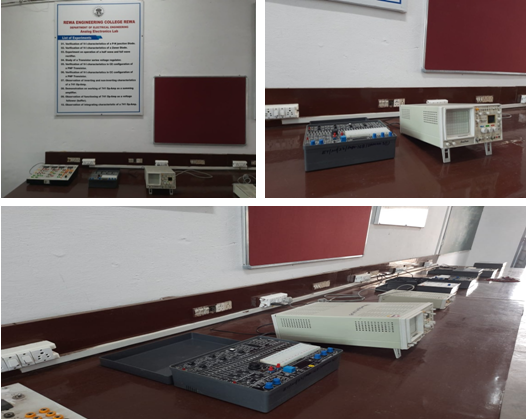
Digital Electronics Lab
Digital Electronics Lab
This lab takes care of the understanding of the design of various digital electronics circuit components and implementations taught at undergraduate level.
The various experiments which can be performed at Digital Electronics Labs are as follows:-
- 1. To carry out addition and subtraction on two 4-bit binary numbers with the help of 4-Bit binary Full Adder and Sub tractor.
- 2. To observe the operation of Decimal to BCD Encoder.
- 3. To observe the operation of Decoder.
- 4. Verification of the characteristic table of JK flip-flop.
- 5. Verification of the characteristic table of SR flip-flop.
- 6. To observe the operation of Ring Counter.
- 7. To observe the operation of Bidirectional Universal Shift register.
- 8. To observe the operation of MOD-10 Asynchronous counter (Decade Counter).
- 9. To carry out conversion from digital signal to analog signal through D to A Converter.
- 10. To carry out conversion from analog signal to digital signal through A to D Converter.
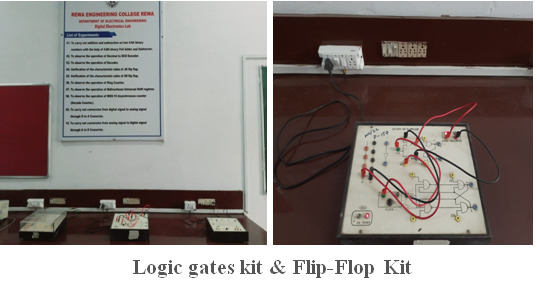
Network Lab
Network Lab
In this laboratory of the electrical engineering department has various types of working equipments and kits which are helpful in understanding the different types of theorems and parameters.
The various experiments which can be performed at Network Labs are as follows:
- 1. To verify Thevenin Theorem.
- 2. To verify Superposition Theorem.
- 3. To verify Reciprocity Theorem.
- 4. To verify Maximum Power Transfer Theorem.
- 5. To verify Millman’s Theorem.
- 6. To determine Open Circuit parameters of a two port network and to determine short circuit parameters of a two port network.
- 7. To determine A,B, C, D parameters of a two port network.
- 8. To determine h parameters of a two port network.
- 9. To find frequency response of RLC series circuit.
- 10. To find frequency response of RLC parallel circuit.
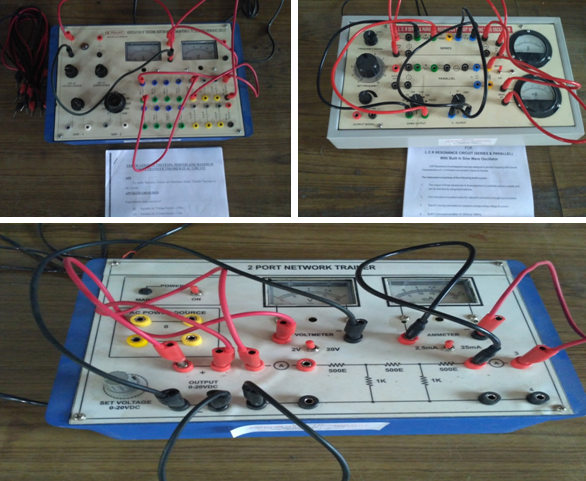
Control Systems Lab
Control Systems Lab
The Control Systems Lab in the Department of Engineering Technology contains a variety of laboratory equipments used in design and experimentation of digital and analog electromechanical feedback control systems. CS Lab used for 4th sem. Electrical Engineering students. In this laboratory all the experiments as per the curriculum of RGPV, Bhopal.
The various experiments which can be performed at Control Systems Labs are as follows:
- 1. Observation of response of a first order system with a square wave input.
- 2. Observation of effect of disturbances upon a second order system.
- 3. Verification of time response of atype-1 second order system with a square wave input.
- 4. Determination and verification of under damped, critically damped and over damped response of a second order circuit designed using an active network consisting of R, C and Op-Amp.
- 5. Determination of critical gain and critical period of oscillation with P controller for 1st order type-0 system having delay.
- 6. Determination of critical gain and critical period of oscillation with PI controller for 1st order type-0 system having delay.
- 7. Finding the delay (L) and time constant (T) from an experimental process response curve.
- 8. Plotting of response curve of a Lag compensator.
- 9. Plotting of response curve of a Lead compensator.
- 10. Measuring the effect on transient and steady state specifications of a process in the presence of a compensator.
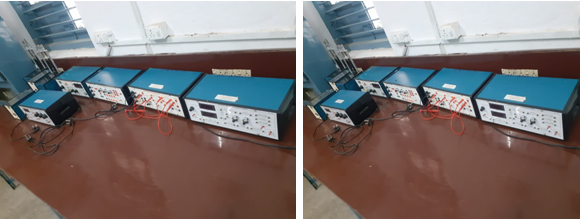
Measurement & Instruments Lab
Measurement & Instruments Lab
Electrical measurement & instruments lab mainly provides the facilities to learn the application of instrumentation systems in electrical systems. The experiments available in this lab are low and high resistance measurement by Kelvin's double bridge, Whetstone’s bridge method s respectively.
The various experiments which can be performed at Measurements and Instruments Labs are as follows:
- 1. Measurement of low resistance using Kelvin’s Double-bridge.
- 2. Measurement of medium resistance using Whetstone’s bridge.
- 3. Measurement of Insulation resistance using Megger.
- 4. Measurement of earth resistance by fall of potential method and verification by using earth tester.
- 5. Measurement of power in a single phase ac circuit by 3 voltmeter/ 3 Ammeter methods.
- 6. Study of various types of indicating instruments.
- 7. Measurement of Power in three phase circuit by one, two & three watt meters.
- 8. Study of Piezo -Electric Transducer.
- 9. To study characteristics graph of LVDT Sensor.
- 10. To study load measurement using Strain Gauge.
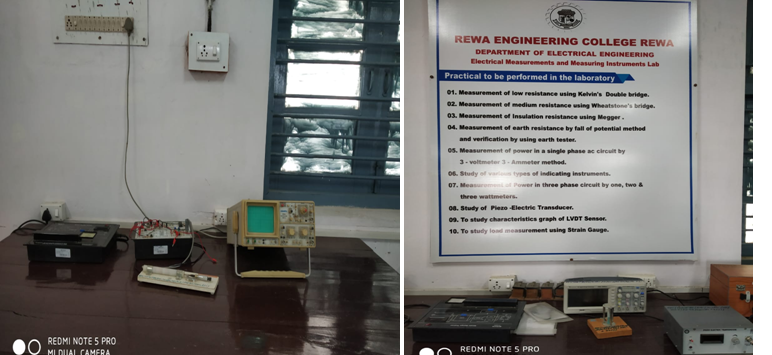
Electrical Machines Lab
Electrical Machines Lab
The Electrical Machines Laboratory is the one of the important Laboratory of Electrical Engineering Department. The Laboratory is equipped with conventional and modern Electrical and Electronics measuring equipments, various AC and DC Electrical Machines and Transformers.
This Laboratory caters the need of Under Graduate Students to enable them to easily understand the basics and adapt to advanced experiments like modeling of Electrical Machines and special Electrical Machines. Also, the Laboratory is used for research activities in machines and to carry out project works in the design of Electrical Machines. The various experiments which can be performed at Electrical Machines Lab are as follows:
- 1. To perform Open Circuit & Short Circuit test on Single Phase Transformer.
- 2. To determination Voltage Regulation of Single Phase Transformer.
- 3. To perform Polarity test on Single Phase Transformer.
- 4. To plot external characteristics of DC Shunt Generator.
- 5. To perform Load test on Three-Phase Induction motor.
- 6. To determine the parameters of synchronous machine.
- 7. Separation of Hysteresis and Eddy current losses in Single Phase Transformer.
- 8. To perform No load & Blocked rotor tests on slip ring induction motor.
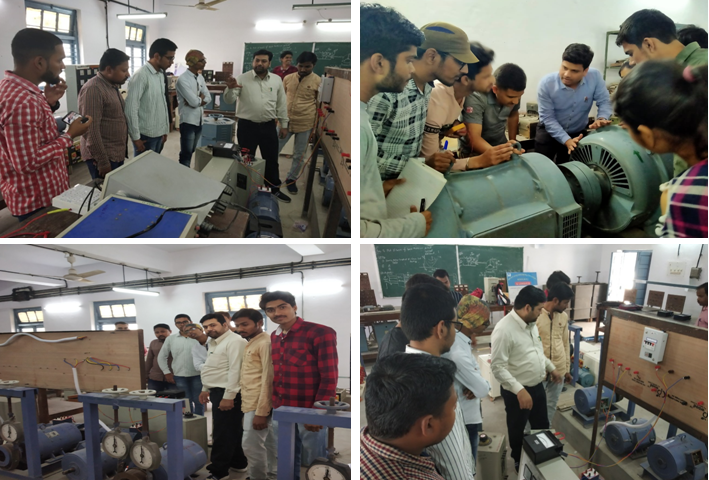
Electric Drives Lab
Electric Drives Lab
In this laboratory of electrical engineering department contains different types electrical machines such as d c machines (dc shunt motor ), ac machines (induction motors ) with PWM inverter ,VSI and CSI also. All the experiments are under the curriculum of RGPV Bhopal. The various experiments which can be performed at Electrical Drives Lab are as follows:
- 1. To perform speed control of DC Shunt motor using armature and field control.
- 2. To perform the electrical braking of DC shunt motor.
- 3. To simulate and analyze MATLAB based chopper fed separately excited DC motor.
- 4. To analyze Chopper fed DC motor drives.
- 5. To observe Speed control of DC motor using closed loop and open loop control.
- 6. To perform the voltage control of three phase induction motor.
- 7. To analyze VSI fed Induction motor drive.
- 8. Modeling and Simulation of PWM inverter fed three phase Induction motor control using MATLAB software.
- 9. Modeling and Simulation of VSI fed Induction motor drive using MATLAB software.
- 10. Modeling and Simulation of CSI fed Induction motor drive analysis using MATLAB software.
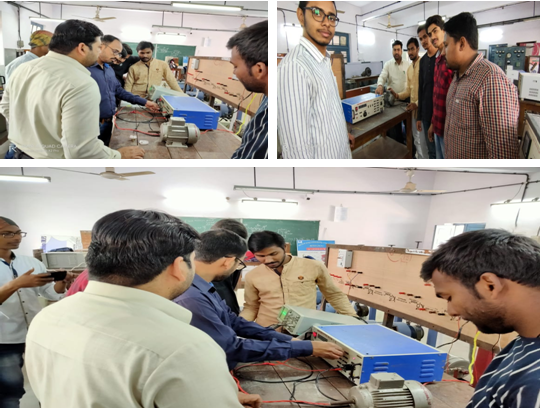
Power Electronics Lab
Power Electronics Lab
The Power Electronics Laboratory in Electrical Engineering Department at REC, Rewa enhances the knowledge of Undergraduate Students by providing better understanding of the concepts and working of advanced Power Semiconductor Devices and Power Electronics Circuits. This Laboratory is equipped with Single Phase and Three Phase AC to DC Converters, different types of DC-DC Choppers, Single Phase AC Voltage Controllers, Cyclo -converters, Single Phase and Three Phase Inverters. The various experiments which can be performed at Power Electronics Lab are as follows:.
- 1. To obtain the output and transfer characteristics of Power MOSFET.
- 2. To obtain the output and transfer characteristics of IGBT.
- 3. To observe and analyze the waveforms of control and power circuit of SCR based 1Φ half controlled bridge converter.
- 4. To observe and analyze the waveforms of control and power circuit of SCR based 1Φ fully controlled bridge converter.
- 5. To observe and analyze the waveforms of control and power circuit of SCR based 3Φ fully controlled bridge converter.
- 6. To perform commutation of SCR through various classes of commutation i.e. A, B, C, D, E and F.
- 7. To verify the operation of Step down chopper.
- 8. To verify the operation of Step up chopper.
- 9. To verify the operation of SCR based series inverter.
- 10. To verify the operation of SCR based parallel inverter.
- 11. To observe the effect of frequency and duty cycle variation on SCR based parallel inverter (PWM type) with resistive load.
- 12. To observe phase control using TRIAC.
- 13. To observe and analyze the operation of SCR based cyclo converter.
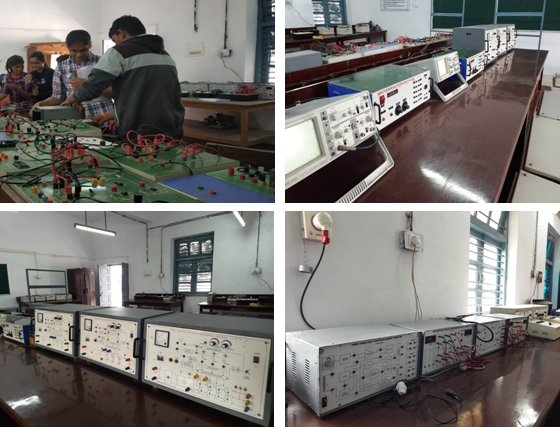
High Voltage Lab
High Voltage Lab
The High Voltage Laboratory has state-of-the-art equipment that can be used in the testing of materials and the study of different HV phenomena. The high number of MWB HV modules allows designing high-level detailed setups that can be used for experiments with fundamental HV theories. This is essential for students as HV engineering in nature is an experimentally based science.
The HV laboratory also has an 800kV impulse generator for testing with both lightning and switching impulses. The various experiments which can be performed at High voltage Lab are as follows:
- 1. Measurement of breakdown voltage of transformer oil.
- 2. Measurement of Breakdown Voltage of transformers.
- 3. Calibration of High Voltage Probes.
- 4. To study of high voltage ac measurement.
- 5. Measurement of breakdown strength of solid insulating materials.
- 6. Design an EHV transmission line in MATLAB.
- 7. Study of string Efficiency & the no. of Insulators (Units) used in a String Insulator.
- 8. To study of high voltage ac measurement.
- 9. Study high voltage testing of electrical equipment.
- 10. Study direct testing and indirect testing of circuit breakers.
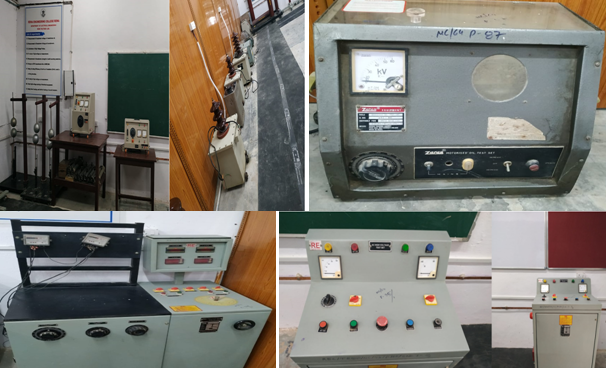
Computer Programming lab (JAVA)
Computer Programming lab (JAVA)
A Java Programming lab manual is intended to provide a basic knowledge of java programming for students. To develop software development skills in java programming and Students will have the proficiency to develop projects in java programming. The course helps the students to solve the inter disciplinary applications through java programming. The various experiments which can be performed at Computer programming Lab are as follows:
- 1. To write importance of Object Oriented Programming. Mention different features of JAVA.
- 2. To develop a program to add two numbers in JAVA, run the program and obtain the result.
- 3. To write a program to show whether a number is Prime or not, run and verify the result.
- 4. Using concept of class in JAVA, run the program and obtain the result in JAVA.
- 5. To show complex number addition using JAVA.
- 6. With the use the Constructor in JAVA, develop a program, run and obtain the result.
- 7. To develop a program to show exception handling in JAVA.
- 8. To develop a program to show polymorphism handling in JAVA.
- 9. Show with the help of a program that a file may be hidden in JAVA.
- 10. Write a program to show “HELLO JAVA” in Explorer.
- 11. Using Switch statement, write a program in JAVA.

Departmental Activities
Every year department of electrical engineering organizes short term courses/ workshops/ hands-on training/ industrial visits/expert lectures/ internship programs on various topics of current interest and recent trends of electrical engineering for students and faculty members of the department through online and offline mode. Faculties of the department deliver expert lectures in nearby private technical institutions. Faculties of the department have been encouraged to attend various Pedagogy Conferences/FDP/ STTP/ STC and workshops at different premier institutions of the nation. Here are some glimpses of the activities held in the department:
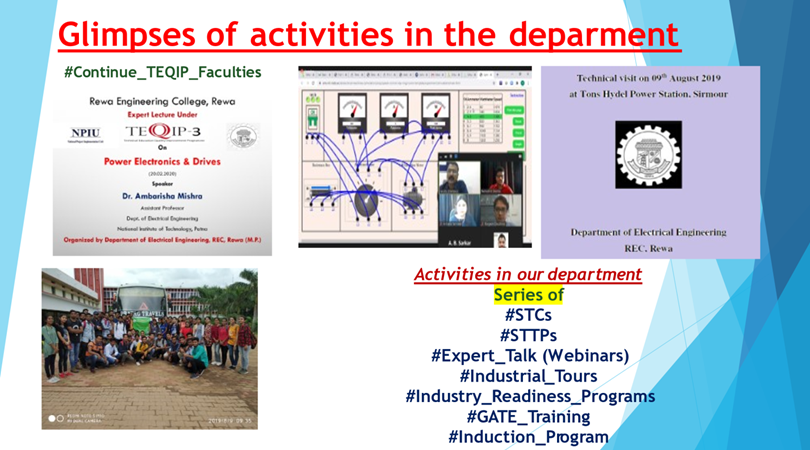
1. Hands on session on virtual lab (Date:20/10/2020)
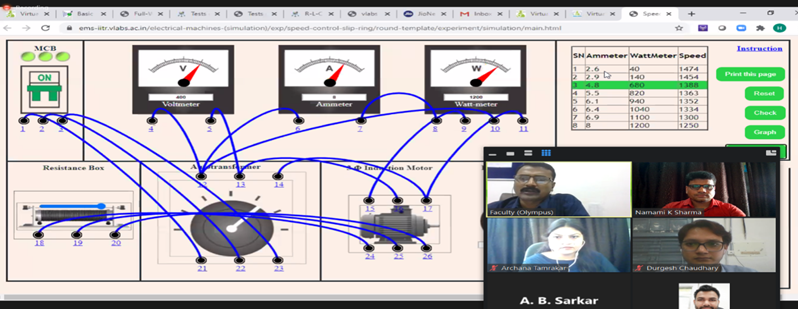
2. Convertor Harmonics: Causes & Elimination (Date: 27/07/2020)
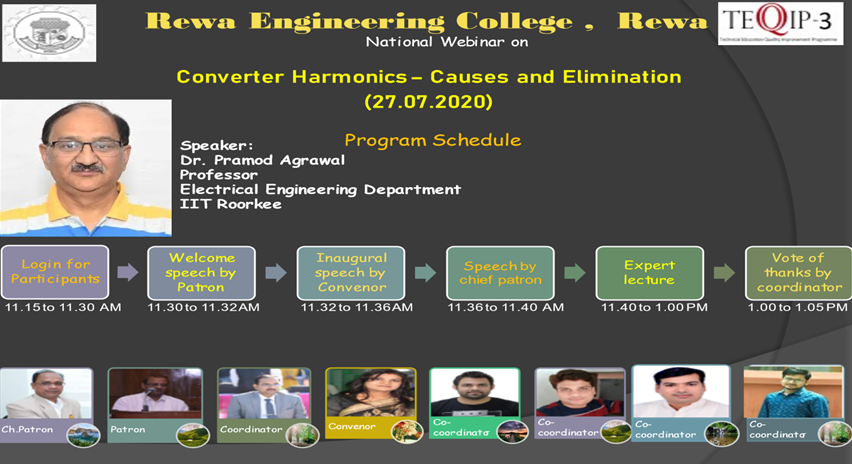
3. Webinar on Managing Stress During Uncertain Times (Date: 13/06/2020)
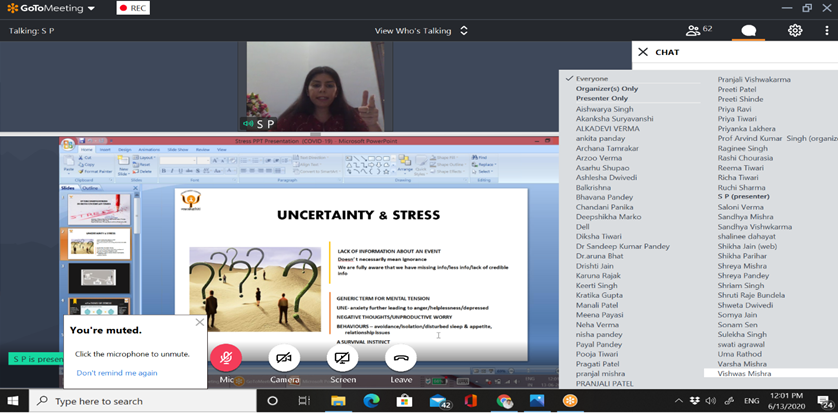
4. Expert lecture on ‘Power Electronics & Drives’ on 20/02/2020 at REC Rewa.
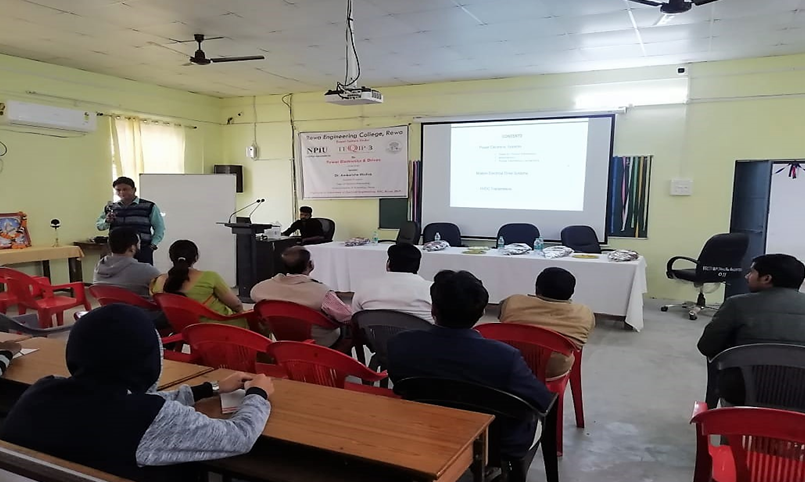
5. Industrial visit at THPS Sirmour (Date: 09/08/2019)
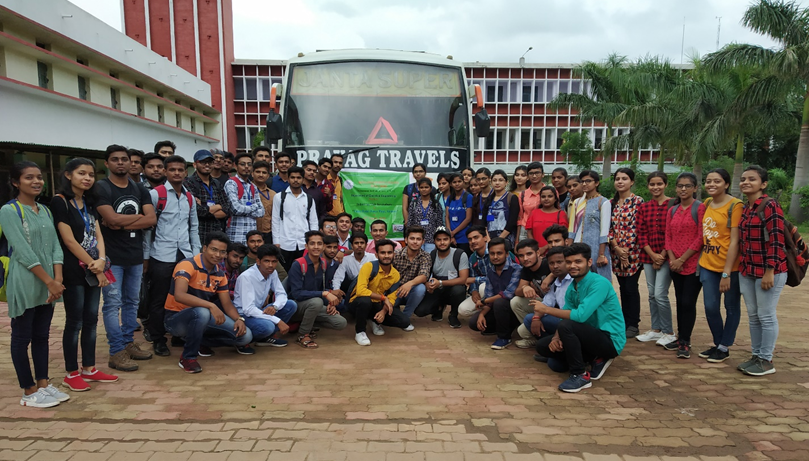
Consultancy Services
The department of Electrical Engineering provides various testing services such as testing of Ammeter, Voltmeter, Energy meters, Insulation Tester, Earth Tester, Motors (Submersible / Induction) & Welding Transformer etc.
| Sr. NO. |
Year |
Total |
| 1 |
2015 |
More than Rs. 25000 per year |
| 2 |
2016 |
| 3 |
2017 |
| 4 |
2018 |
| 5 |
2019 |
| 6 |
2020 |